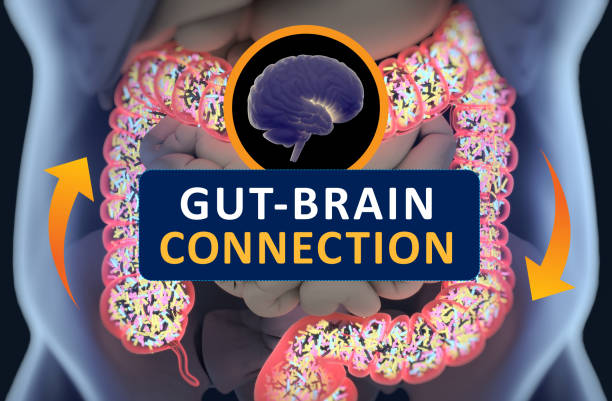
Your brain and your gut may be far apart, but throughout the day they are chatting. The strong association determines your moods, thoughts, diet, and sleep. Much of the time, individuals experience stress, mood changes or inadequate energy without knowing that their gut is a major contributor to it. Gut-brain linkage indicates that your gut serves other functions than just digestion of food. It also alerts your brain with mood through focus and memory.
Your mind remains relaxed when your gut is in good condition. However, gastrointestinal may add up to have a toll on your mental health. Understanding the relationships between the gut and the brain enables you to treat them better. This article identifies the way your stomach communicates with your brain and why this connection is important to your mental and physical well-being.
How the Gut and Brain Communicate
A message is sent between the gut and brain on a direct line, the vague nerve. These messages pass in both directions between your brain and your intestinal system. When you have a tight stomach as a result of stress, then, you are experiencing the influence of the vaguest nerve. When you eat a good meal that leaves a satisfied feeling in your gut, you receive relaxed messages in your brain.
Neurotransmitters, which are the brain chemicals controlling mood are also manufactured in the gut. The gut produces about 90 percent of serotonin that enables you to feel happy. Your gut contains other chemicals such as dopamine and GABA. These messengers pass through your blood or messages in the nerve and aid in maintenance of the mood, sleep and concentration. The two-way communication is known as the gut-brain axis. It demonstrates that your brain and your gut are a unit. When something is wrong, it tends to affect the other.
Why Your Gut Health Affects Mental Health
It is common with many individuals that they treat mental health and gut differently. Scientists have however realized a great connection between the two. When your bowel is inflamed or not in balance then your brain can become cloudy, anxious or depressed. Microbiomes are trillions of bacteria which live in the bowel. These small living organisms assist in digestions of food, defense against infections and synthesis of brain chemicals. A good population of well bacteria is present in a healthy gut. These bacteria maintain the lining of the gut and the immune system stable.
When your gut leaks or when its good bacteria is lost, your immune system acts up. Procedures lead to inflammatory spread and the increase of stress hormones. There is a possibility that nothing is wrong but there might be the same signals that something is wrong in your brain. Anxiety, depression or chronic fatigue can be the result. Restoring gut health usually makes individuals mentally feel improved. That is why in modern society doctors examine diet and probiotics as well as gut-friendly routines to relieve anxiety and mood maintenance.
Signs Your Gut May Be Affecting Your Brain
There are times when your head is not right because it is based on the gut. The connection is something you will not be aware of, and in most cases, the symptomatic tends to be the gut. Some of these things to look out include:
- You are anxious even when you know of no reason why you are anxious.
- It happens most days that you wake up fatigued or you are muzzy.
- There is bloating, gas or stomach pain frequently.
- The mood swings make you feel dependent on something or when you eat.
- There are food cravings accompanied by low energy.
- Sometimes you feel low or sad when things in life are not bad.
These are some of the indicators that your intestinal flora has to be helped. When you enhance your gut health and decrease the stress there, your brain tends to get better as well.
How to Support a Healthy Gut-Brain Connection

It is possible to take care of your gut and your brain through improved habits. The following points assist both systems to remain balanced:
1. Eat More Whole and Plants Foods
Fruits and vegetables, beans and whole grains are some fruits that can nurture good gut bacteria. They assist in making your microbiome grow healthy and balanced. Leafy greens as well as berries, apples, oats and lentils are all beneficial to the gut.
2. Fermented Foods should also be considered
Fermented foods supply you with gut microorganisms, called probiotics. They increase positive emotions and digestion. Eat yogurt, kefir, kimchi, sauerkraut or kombucha. Have them as routine to have a healthy collection in the gut.
3. Cut Spread and Processed Foods
Excessive sugar serves bad bacteria in the colon. Refined foods are also usually known to contain chemicals that are detrimental to the bowel walls. Opt for fresh, actual foods, and refrain from boxed and fried snacks to lower the inflammation.
4. Keep Moving About Daily
Workouts increase the flow of blood to your intestines and the brain. It aids to normalize the digestive system and reduces stress hormones. A half an hour of walking, stretching or dancing daily is helpful to body and mind.
5. Deal with Stress When Keeping It Cool
Stress damages the gut and brain with time. Nervous system resets can be achieved through deep breathing, meditation, journal or quiet walks. Gut tension and mood can be improved and relaxed even in five minutes a day.
6. Enough Sleep at Night
Eight hours of sleep helps to regenerate your gut. Shoot to get 7-9 hours per night. A good sleep habit assists the brain in repairing itself and reduces inflammation in the gut.
7. Drink More Water
Water also aids in digestion and makes your guts lining strong. Attempt to have at least eight glasses per day. When needed, add some flavor with lemon or herbs.
Is it possible to enhance mental health with Probiotics?
Williams Probiotic supplements are used by many people as an aid to give the balance of the gut. They are shown by some studies also to enhance mental health. Such special probiotics can be referred to as psycho biotics. They aid the brain by enhancing the gut microbiome. Certain strains such as Lactobacillus and Bifidobacterium are promising in decreasing symptoms of anxiety and depression.
These bacteria can potentially diminish inflammations as well as enhance the mood chemistry of the brain. Nevertheless, probiotics are not a remedy. They are effective when used with healthy food, sleep and stress management. If you are using medications, you really should talk to a doctor before trying new supplements.
Why the Gut-Brain Link Matters for Everyone

Your stomach does not influence digestion only. It is important in your thinking process, feelings and daily stressing. The gut-brain axis actually forms mood, sleep, focus and even immune power. A large number of mental issues could be alleviated when gut care is provided. When you are anxious, low or tired, your stomach most likely can tell you something.
The two systems heal by consuming simple actions such as improved nutrition, sleep and reduction of stress. Health practitioners have come to a point of viewing gut health as a whole-body requirement. The brain and the belly are connected and treating the two makes you live full of energy and happiness.
Conclusion
The linkage between the gut and the brain demonstrates the extent at which your mind and body is one. All day your brain receives messages generated by your gut. When you keep your gut level the mood and attention are usually good. When you are not quite in the right mental place, examine your gut health as well. Eat healthier, exercise more and sleep plentifully.
These tiny steps work in favor of your entire system. Your mind will appreciate that and your body will too. The knowledge of such an association alters our self care. And it is not merely what you think or what you eat, but how they act in assistance of the other. Use habits that respect your gut and your brain, and there is a possibility you may feel stronger than you ever did in your life.






